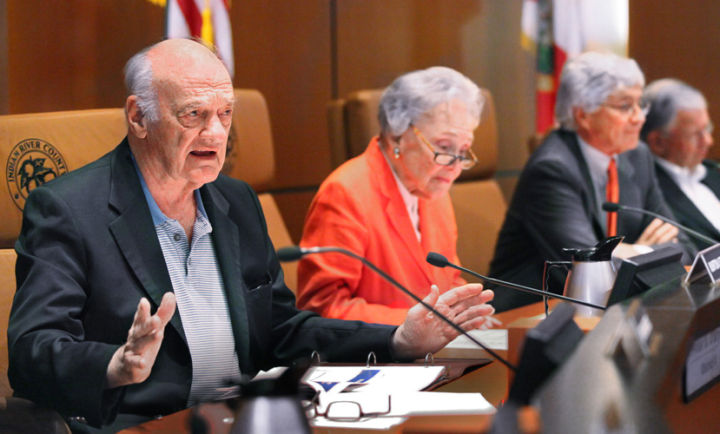
INDIAN RIVER COUNTY — In a surprise change of course last week, hospital CEO Jeff Susi withdrew a request for the Hospital District to approve the new Cancer Center, which puts the once highly touted but now increasingly controversial project on at least temporary hold.
Instead, at last week’s Hospital District meeting, Susi used time previously reserved for Cancer Center approval for a presentation by hospital Chief Medical officer Charles Mackett on Indian River Medical Center’s improvements in patient care.
Mackett told the seven elected District Trustees, who directed over $8 million in taxpayer dollars to the hospital this year, that the purpose of his presentation was “to set the record straight” about the quality of patient care at the hospital.
When asked by Vero Beach 32963 after the meeting what record needed to be set straight, Mackett said he was referring to numbers provided to the Hospital District in a letter from a local doctor.
The letter and the numbers, which are part of the public record, came from Medicare.
Nevertheless, the presentation proceeded with slides and numbers presenting a more positive picture of hospital performance.
For example: In the current fiscal year, according to Medicare and CEO Susi’s own words, the hospital will lose $58,000 in Medicare reimbursements for falling below the 50th percentile nationally in treatment of heart attacks, heart failure, pneumonia, surgical care and clot prevention.
But the hospital’s performance in those treatment areas was described by Mackett as “continuing to improve” although the numbers remained below the 50th percentile.
Recent hospital communications are a concern to Hospital District Trustees as information presented by hospital leadership sometimes clashes with the hospital’s own documents and what has already been presented.
After the September forced-terminations by Susi of two hospital executives, well-versed in hospital finances, Susi hired a new CFO who gave more promising numbers.
And, while hospital documents said that the hospital had $29.8 million cash on hand – a precariously low amount – Susi wrote doctors and the foundation board that the amount was really $55.5 million, counting some other foundation money.
Susi said the new Cancer Center, which has been delayed, would make a $4.5 million profit after five years, ignoring that if it were not built, the existing cancer program is projected to make a $7 million profit, according to hospital documents.
And, when asked about the current cost of the new Cancer Center’s contracts with Duke University, Susi said it was $300,000, when hospital documents show the three-part contract to be closer to $600,000.
At last Thursday’s Hospital District meeting, the opposing statements continued with the presentation by Mackett, who is held in high regard by the medical community and frequently described as “a good soldier in a tough position.”
Mackett pointed to 10 areas of patient satisfaction where Indian River Medical Center rated better than Sebastian River Medical Center in seven of the areas and better than Lawnwood Regional Medical Center in eight of them, and better than the Florida average in nine of them.
But he did not mention that the hospital rated below the national average in eight of 10 patient satisfaction categories.
And, he omitted the 21 categories where IRMC rated below the two neighboring hospitals.
The few times that Mackett mentioned comparatively low ratings for the hospital, he characterized them as “opportunities for improvement.”
When he referred to negative Medicare and patient satisfaction data on the emergency room as “myths out there,” district trustee Burton Lee told him: “It is not myth, unfortunately. I know people who waited six hours in the ER to be seen. One of them got a turkey sandwich for being a Golden Eagle (a donor giving over $10,000 to the hospital).”
“It is something that needs to be fixed,” said Lee.
Medicare records show that in 2012, the average wait-time in the ER was 352 minutes. Mackett, however, presented the average wait-time for the past four months as being 29 to 37 minutes. Those numbers are not yet available from Medicare.
He told the District Trustees: “Our numbers of ER patients who left without being seen since June are decreasing and are becoming very low.”
But the hospital’s own documents tell a different story: In June, 2013, 233 people left the emergency room without being seen after filling out an initial form. In July, 149 people left.
In August, the number was 115, and in September, 150 people left the ER without being seen by a healthcare professional.
In the past four months, a total of 647 people left the ER without being seen, as compared to 217 people over the same four months in 2012.
Mackett ended the presentation by telling the District Trustees that he was pleased to announce that the hospital had just hired a new emergency room management company – Apollo of Atlanta – and looked forward to improvements.
He said the hospital had “undertaken important projects” in order to become even better.



